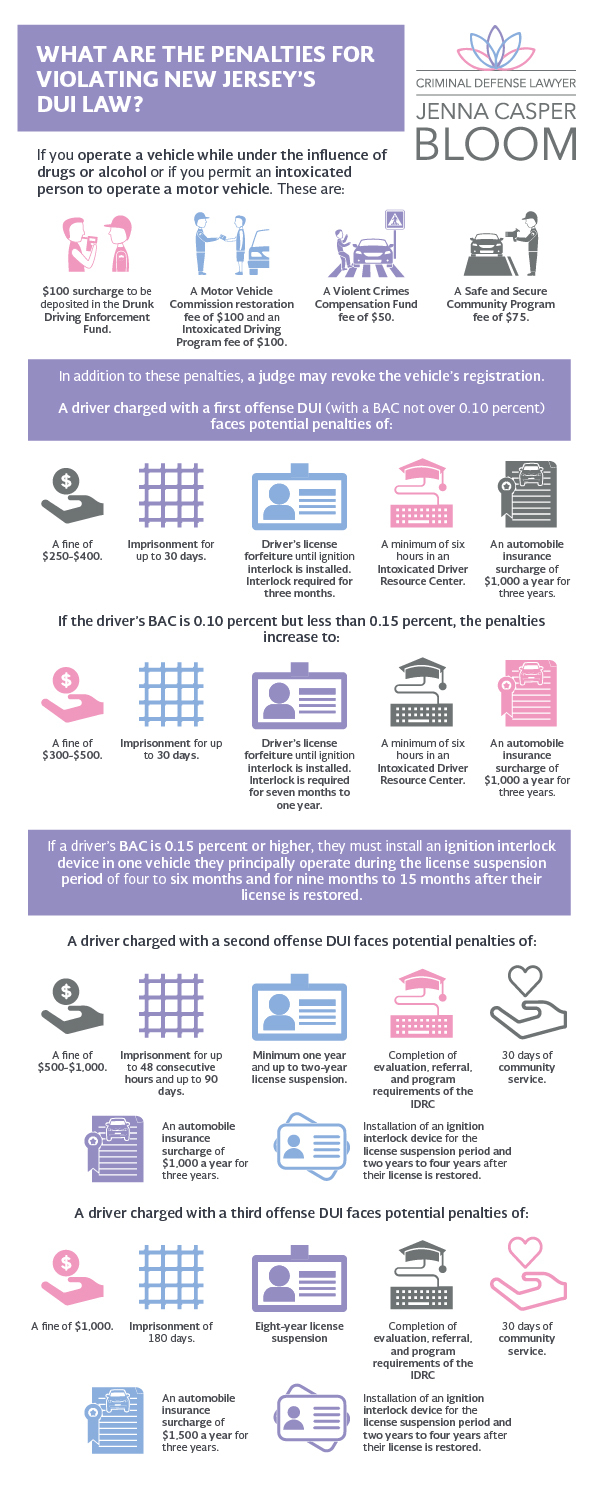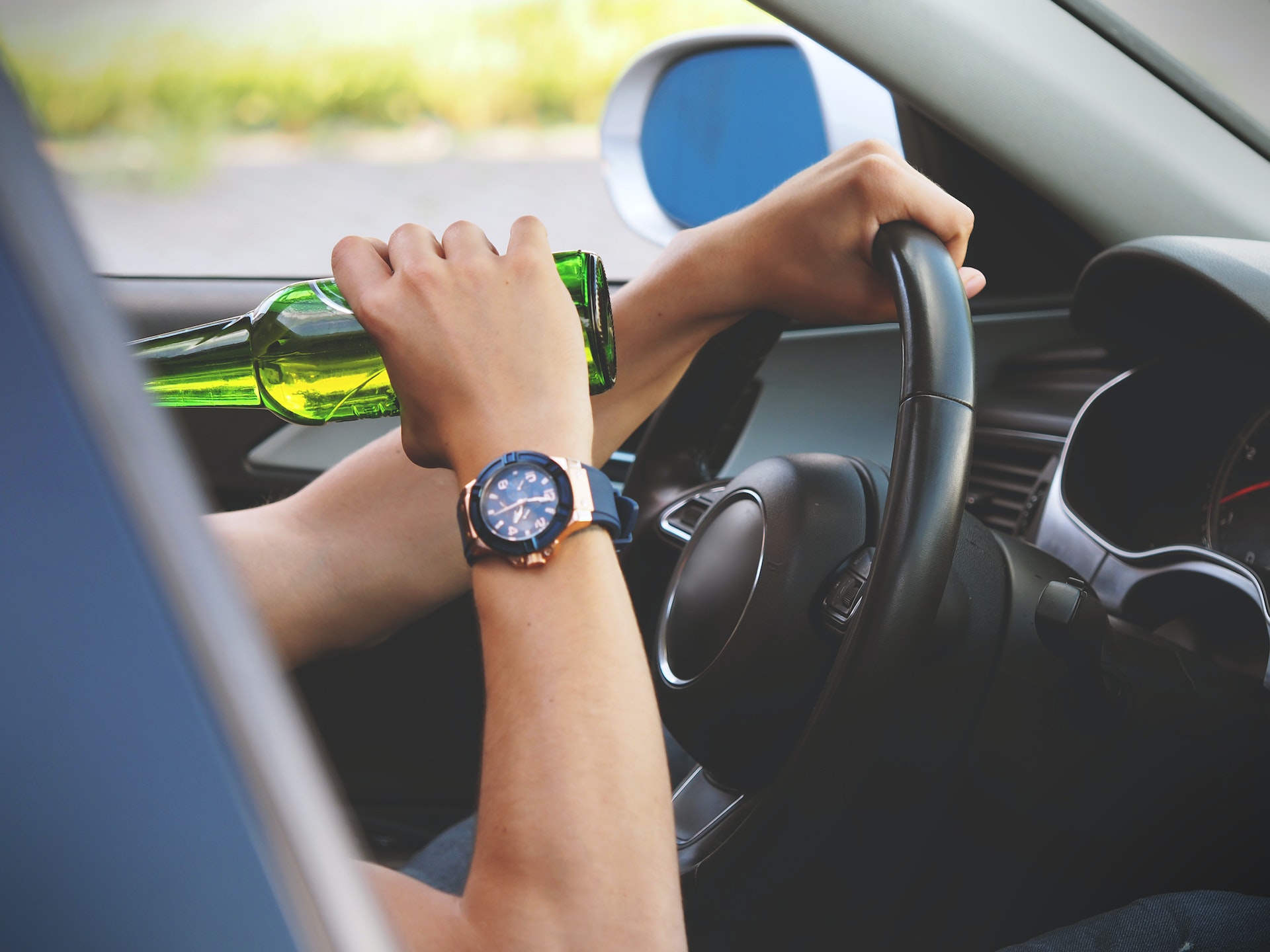You probably know it is against New Jersey law to operate a motor vehicle while intoxicated. You might not know that the law can have a lot of ambiguity about what constitutes “intoxicated,” especially concerning drivers who have legally consumed cannabis. Also, New Jersey has a tiered penalty system that imposes harsher penalties on drivers for second and subsequent offenses. If you have been charged with an NJ DUI, you must understand the potential consequences.
What Does It Mean to Be “Intoxicated” in Violation of the Law?
A driver is per se guilty of drunk driving if they operate a motor vehicle with a Blood Alcohol Concentration (BAC) of 0.08 percent or greater. For drivers under the age of 21, any detectable level of alcohol (.01 percent or greater) constitutes driving while intoxicated. However, you can be convicted of DUI even if your BAC is below 0.08 percent. If you are under the influence of drugs or alcohol and it demonstrably affects your ability to drive, you may be convicted of drunk driving. This can be true even if you consume just a small amount of alcohol or are under the influence of a narcotic, hallucinogen, stimulant, or other drugs—even if the drug is legal for you to consume.
The state must prove a driver is intoxicated to obtain a DUI conviction. Breathalyzer and blood test results are typically introduced as evidence of a BAC over 0.08. Police and traffic officers may testify about a driver’s behavior and provide evidence regarding alcohol intoxication from field sobriety tests at the time of the driver’s arrest.
Unlike alcohol, there is no hard-line rule, acceptable limit, or even agreed testing method for other drugs that can affect a driver. New Jersey police officers currently use a 12-step process called the DRE (Drug Recognition Evaluation) to assess whether drivers suspected of DUI are under the influence of illegal or prescriptive drugs at the time of the testing. However, the scientific reliability and admissibility of this evidence are unclear. A case pending in the New Jersey Supreme Court, State v. Olenowski, questions the sufficiency and legality of DRE testing to prove intoxication. The results of this case may significantly impact individuals with pending DUI charges and affect how the state pursues future charges.
What Are the Penalties for Violating New Jersey’s DUI Law?
You may be convicted of DUI if you operate a vehicle while under the influence of drugs or alcohol or if you permit an intoxicated person to operate a motor vehicle. Some fines apply equally to first-time offenders and individuals facing subsequent charges. These are:
- $100 surcharge to be deposited in the Drunk Driving Enforcement Fund.
- A Motor Vehicle Commission restoration fee of $100 and an Intoxicated Driving Program fee of $100.
- A Violent Crimes Compensation Fund fee of $50.
- A Safe and Secure Community Program fee of $75.
In addition to these penalties, a judge may revoke the vehicle’s registration.
A driver charged with a first offense DUI (with a BAC not over 0.10 percent) faces potential penalties of:
- A fine of $250-$400.
- Imprisonment for up to 30 days.
- Driver’s license forfeiture until ignition interlock is installed. Interlock required for three months.
- A minimum of six hours a day for two consecutive days in an Intoxicated Driver Resource Center.
- An automobile insurance surcharge of $1,000 a year for three years.
If the driver’s BAC is 0.10 percent but less than 0.15 percent, the penalties increase to:
- A fine of $300-$500.
- Imprisonment for up to 30 days.
- Driver’s license forfeiture until ignition interlock is installed. Interlock is required for seven months to one year.
- A minimum of six hours a day for two consecutive days in an Intoxicated Driver Resource Center.
- An automobile insurance surcharge of $1,000 a year for three years.
If a driver’s BAC is 0.15 percent or higher, they must install an ignition interlock device in one vehicle they principally operate during the license suspension period of four to six months and for nine months to 15 months after their license is restored.
A driver charged with a second offense DUI faces potential penalties of:
- A fine of $500-$1,000.
- Imprisonment of at least 48 consecutive hours and up to 90 days.
- Minimum one year and up to two-year license suspension.
- Completion of evaluation, referral, and program requirements of the IDRC.
- 30 days of community service.
- An automobile insurance surcharge of $1,000 per year for three years.
- Installation of an ignition interlock device for the license suspension period and two years to four years after their license is restored.
A driver charged with a third offense DUI faces potential penalties of:
- A fine of $1,000.
- Imprisonment of 180 days. The court may lower this term for each day, not exceeding 90 days, served in a drug or alcohol inpatient rehabilitation program approved by IDRC.
- Eight-year license suspension.
- 30 days of community service.
- Completion of evaluation, referral, and program requirements of the IDRC.
- An automobile insurance surcharge of $1500 per year for three years.
- Installation of an ignition interlock device for the license suspension period and two years to four years after their license is restored.

Ignition Interlock Devices
An ignition interlock device measures the driver’s blood alcohol level before allowing the driver to operate the vehicle. A driver convicted of DUI may be required to have one of these state-approved devices installed (by an approved installer) and maintain it for up to three years following the restoration of their license. Before starting the vehicle, the driver must blow into the device; it also requires periodic “rolling tests” while the vehicle is in motion. For safety reasons, the vehicle will not shut off if the driver does not conduct and pass these in-motion tests, but the information will be recorded. Failure to comply with the requirements can result in further penalties, such as revocation of your driver’s license. However, these devices can malfunction or record incorrect data. If you believe this has occurred, you may need to contact an attorney.
Contact Jenna Casper Bloom Today
If you have been charged with a New Jersey DUI or related offense, you should contact an experienced attorney like Jenna Casper Bloom. A conviction can have significant consequences for your wallet, impact your driving privileges, and affect many other areas of your life. An attorney may be able to help you contest the charges, negotiate a reduction in the penalties, or have the case dismissed.


